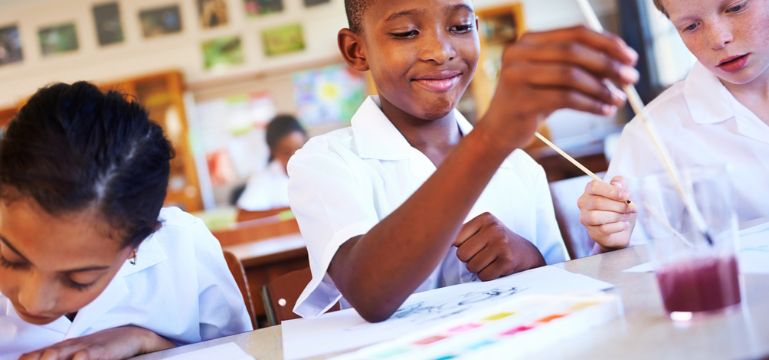Providing authentic and engaging experiences in the nursery provision to inspire children’s love of learning and develop their independent skills

Quick links:
Information about the school
Coed Glas Primary serves the community of Llanishen to the north of Cardiff. The school has 535 pupils on roll. The area surrounding the school has a mixture of social, rented and privately owned property. The school population reflects this rich and diverse catchment area. Approximately 36% of pupils are eligible for free school meals, which has increased significantly over the past several years with the local authority average being 21.5%. The school is within the 20-30% most deprived area in Wales according to the Welsh Index of Multiple Deprivation. The number of children with EAL has risen to 28%. Due to increasing numbers of children requiring a school place in north Cardiff, the school has admitted up to 90 children in each year group over the last seven years, resulting in three classes per year group in many cases.
There are 18 mainstream classes of single aged groupings, a 48-place nursery and a special resource base (SRB) catering for up to 16 children with hearing impairment from across Cardiff.
Context and background to the effective or innovative practice
The school sought to develop the knowledge and skills of its early years team through collaboration, research and motivating change. They perceive the learning environment as playing the role of the third teacher and worked to create a nursery setting that is inviting, calm and inspires learning.
The children entering nursery during the current academic year were born during the Covid pandemic. Practitioners noticed that an increasing number of them had speech and language delay and underdeveloped gross and fine motor skills. They recognised a requirement for a new approach to help address this and that the nursery needed to be set up in a way to nurture and develop these skills and encourage independence.
Description of nature of strategy or activity
In the nursery environment, practitioners provide opportunities for children to use real life resources to make independent choices and to solve problems. Brightly coloured plastic toys have been replaced with real-life, open-ended resources and ‘loose parts’. Practitioners only intervene in the pupils’ play when they feel there is a good opportunity to expand on their learning and understanding.
Staff have high expectations of all children and celebrate a growth mindset. Practitioners play a key role in modelling and nurturing independent skills. This is evident in the nursery’s daily snack provision. Nearly all pupils pour their own drinks, handle knives, peelers and other tools safely, and wash their own cups and plates. Practitioners also use this time to develop pupils’ use and understanding of Welsh.
The nursery session follows the ‘rhythm’ of the child, and their learning is not interrupted to stop for focused activities. During the two-and-a-half-hour session, practitioners aim to achieve a balance where children have the opportunity to develop important life skills but also, follow their passions and interests. When a pupil makes a discovery or asks a question, the practitioners follow the their lead and give them time, space and support to investigate and explore their thoughts and ideas further. This approach directs all of the pupils’ learning.
Where the school identified writing as a whole-school action on the school improvement plan, the nursery practitioners began research into the pre-writing skills needed for children to write. All learning in the nursery aims to build the foundations needed in readiness to write, such as developing the children’s core muscles through outdoor play, and opportunities to develop coordination through large scale painting at different heights and angles.
What impact has this work had on provision and learners’ standards?
By providing the children with open-ended, real-life resources, which spark curiosity, the children have become more actively involved in their learning. Children are engaged in their play for longer periods of time as they construct, collect, sort and combine resources with other materials.
Children entering nursery with speech and language delays have shown significant progress. The long periods of meaningful, authentic play supported skilfully by practitioners ensure that these skills are modelled and developed.
By adapting nursery sessions around the rhythm of the child, we have observed children make deeper connections in their learning and master specific skills.
The school expects to see the impact of the focus on pre-writing readiness as the children progress further through school, developing a love for writing and pupils’ confidence in their own writing abilities.
How have you shared your good practice?
The school has hosted visits by newly qualified teachers from other schools to observe the effective practice.